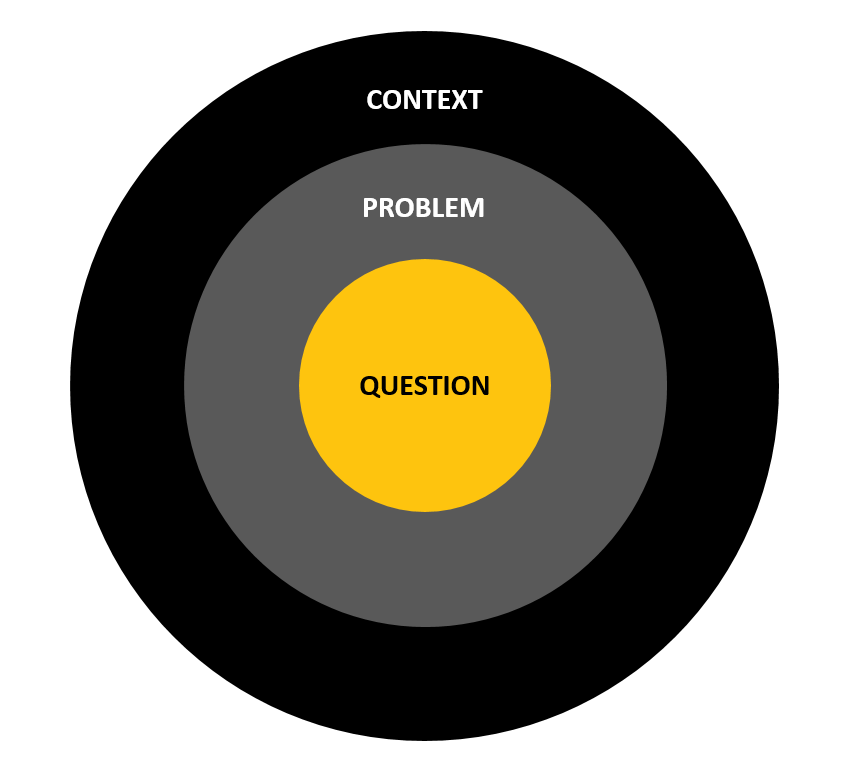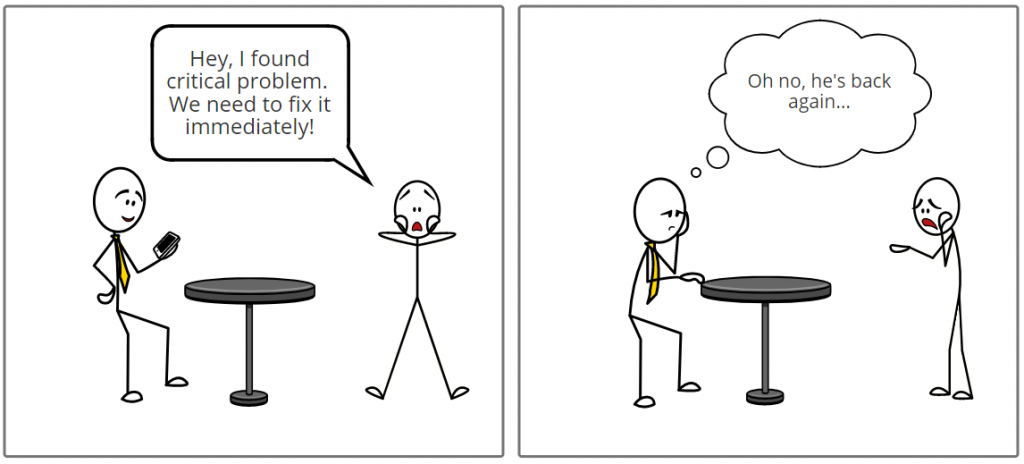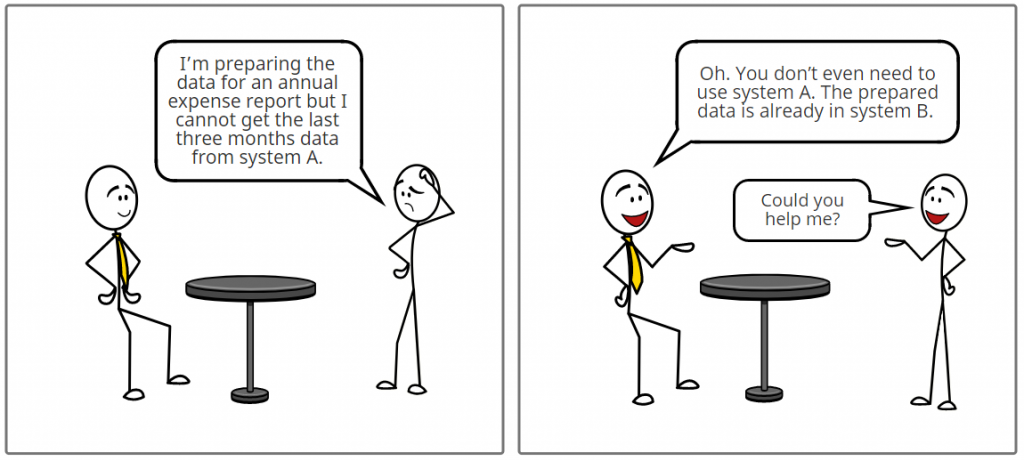
There are certain jobs that require asking questions. Lawyers, managers, coaches and journalists need to know how to ask perfectly-tailored questions to elicit precisely the information they require in order achieve what they want. A productive conversation is one of the most important tools in their toolbox.
However, asking great questions is a valuable skill also when it comes to other types of jobs. Software engineers (and any other engineers for that matter), accountants, salesmen and other professionals need to ask questions in order to understand, learn and build certain connections. Apart from to whom and why questions are important, their form is equally crucial, both in face-to-face interactions and in electronic communication.
One study [1] examined how the quality of a question was related to its answers. Scientists, who conducted the study, gathered data from Community Question Answering (CQA) websites, like StackOverflow, which contained millions of users, questions and answers. The results showed that there was a strong relation between the quality of questions and the quality of answers. High-quality questions had a better chance of receiving high-quality answers and those questions attracted more attention within the first 24 hours of being posted. As it was explained:
“(…) it might be very difficult for a low-quality question to attract a high-quality answer due to, e.g., its poor expression in language, lack of interest in topics, etc.”
That’s why you should improve the way you ask questions no matter what kind of a position you hold or whether you communicate your questions face-to-face or electronically. This issue affects everyone. So let’s start with a few basic rules.
Less is more
It’s a common problem among junior employees. They start to ask questions too quickly, before they even understand what they need to ask about. Instead of spending some time on simplifying and organizing a question, they come to their colleagues right away with just a bunch of chaotic statements.
- This application doesn’t work when I use it. I was trying to open that window but I got an error. Adam asked me to verify whether his changes are fine but I‘m not able to do that because of some errors. I’ve never encountered them before. I’ve also asked Matt to check it but he couldn’t do anything, either. Do you know why it doesn’t work? Could you help me anyhow? I need to verify these changes until 2 pm. That’s what Adam told me.
Wow. That’s too much information which doesn’t really help anyone understand the problem. The question itself is unclear: Do you know why it doesn’t work? Could you help me?
First of all, as an expert I don’t really understand what it is that doesn’t work and what you’re trying to achieve.
And secondly, I don’t know if I can help you because I don’t understand what the problem is. What’s worse, and on a more personal note, the question makes me uncomfortable as an expert. I cannot answer it right away which means my professional ego may be hurt. I’m being flooded with lots of data and I don’t understand what’s going on. It’s usually tempting and very rewarding to answer a question in front of the rest of the team, but in this case I’m not able to do that after hearing only a vague and chaotic description.
Structure makes a difference
What’s the alternative? To use any kind of a structure to organize your thought process. First off, start with less detailed information, an introduction. You don’t need to overload your colleagues with everything you know. Just spend some time on understanding what you are actually struggling with and what exactly the problem is. I suggest using the following pattern, which works in many situations:

That pattern introduces structure to your question and shows that you understand what’s going on. For instance:
(Context) I’m currently testing new changes in HR application and while trying to add new contractors (Problem) I’m getting an error message which reads “New employees cannot be added”. (Question) Do you know what could cause that error?
Now it’s a challenge. There is no redundant information, so I can quickly start analyzing why you cannot add new contractors and what potential problems might have occurred. Maybe the contract period is too long or they don’t have an ID number. It’s not just a generic ask for help, but an interesting puzzle. I can use my expertise, experience and domain knowledge to help you and thanks to that I can shine like a star in front of others. It’s a win-win situation – you get an immediate and accurate answer and my ego is boosted by being able to help and to solve a puzzle.
You need to be precise and informative. Volume is not the key to be understood. Simplifying a question makes it more likely you’ll get a useful answer.
Don’t abuse “clickbait” phrases
I sometimes see people running into a shared workspace or a meeting room shouting loudly “I found a critical problem”. They attract attention and they so badly want to tell everyone what kind of a problem they found. Let’s say we have a colleague who is responsible for testing an IT system. Faced with unspecific issues he cannot execute his tests. Within a second he runs to software engineers or other experts and raises an alarm: “Guys, there is a bug on production! We need to fix it immediately!”. The pressure is up and experts move their attention to that one person. Everybody is all ears. Suddenly, more specific questions start to appear.
- Have you tried doing it this way?
- What are you trying to achieve?
- How was it working before?
- Why is it a problem?
After a while, a heated discussion turns into an awkward conversation, because it turns out it was just a false alarm, a misunderstanding. Of course, communicating the problems is your professional duty and nobody should be scared of doing it. But you need to be aware of an alternative cost.
As a part of the team you are given the benefit of the doubt and each time you raise a false alarm, this benefit decreases. When you do it often, it can even drop to zero really quickly and then it’ll be extremely hard to get it back. It’s like with lying. If it’s just an exception, people quickly forget about it. But if it becomes a part of your daily routine, you are on your way to rapidly losing your credibility. Imagine what would happen if you lost trust within your team members and then you had a real problem. That would be your team’s reaction to you:

Now the problem got much broader. Not only would it be about the team recognition and credibility but it would also be about the impact on the whole company. After a couple of fake alarms, people wouldn’t be eager to listen to the problems raised by such a person. In the end, it could affect the whole company, because the team would start to ignore the really important problems. That’s how cultural erosion starts.
Each time you want to inform your coworkers about a critical problem, make sure it’s actually a real, critical problem. Don’t let your emotions take over. Verify your assumptions once again, collect the data and then have someone confirm it’s a real problem.
Describe a goal, not a step
Do you know that feeling when someone explains low-level details but you don’t even understand the basics, for instance what that person is trying to achieve? That’s typical for people who spend a lot of time working on a specific problem. They tend to forget that others don’t have a clear picture of what they are doing. They come to you with a question:

Then you can spend a lot of time trying to find out what’s wrong with system A which may actually not be required to solve the real problem. What if getting data from system A is not a good solution at all? What if there is a better way? Good questions shouldn’t be tied to one solution specific solution.

The second option allows for an answer with a better solution, specifically suited to your task. Instead of talking about a single step that stops you, begin with clarifying the goal. It’s easy to lose track of where you’re going, so remember to focus on the reason why you ask a certain question.
Conclusion
Asking questions is a powerful tool that you can use not only to learn something new or to solve a problem but also to save your reputation and to build successful relationships. Almost 80 years ago, in “How to Win Friends and Influence People” [2] Dale Carnegie advised us that we should:
“Ask questions the other person will enjoy answering.”
It’s a pretty simple piece of advice that can help you establish fruitful relationships and yet it seems to be forgotten by many people. How can your colleague answer your question if he doesn’t understand it? Unless the question is properly phrased, your respondent will be completely confused and he won’t be able to help you. That’s why I recommend you improve the way you ask questions by following the above-mentioned suggestions. Your colleagues definitely will appreciate it.
References
[1] Yao, Yuan & Tong, Hanghang & Xie, Tao & Akoglu, Leman & Xu, Feng & Lu, Jian. (2013). Want a Good Answer? Ask a Good Question First!.
[2] Dale Carnegie. (1936). How to Win Friends and Influence People. Simon and Schuster.